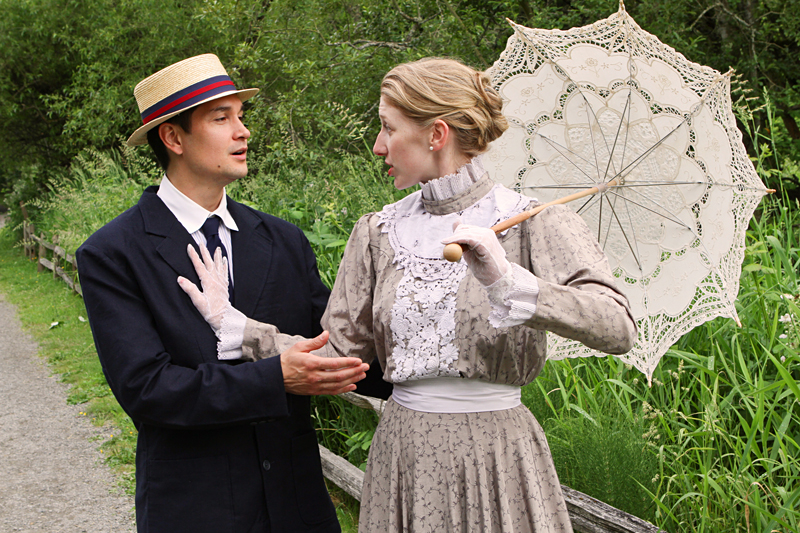Set in an early-1900s world of ragtime, bustles, and spats, Wooden O’s vision of Shakespeare’s most absurd comedy deploys dozens of clever period tropes like so many clowns from a Model T. This Ephesus has ventriloquism, swami-ism, Houdini-ism, handcuffs, Valentino-style tango, and the labile live piano music and title cards (e.g. “A House Divided,” “Love’s Interlude”) once experienced in silent-movie halls. The convoluted story of two sets of separated twins unwittingly converging and repeatedly being mistaken for one another is ingeniously well-suited to the vaudeville treatment—and quite appropriate for a receptive audience of picnickers, dogs, and staggering toddlers.
The play is, we learn from an early title card, “A Shipwrecking Story,” one that requires a gigantic chunk of introductory exposition. Fortunately, the long backstory of storms and fractured families—plus a good deal of text throughout—is delivered via song. In his 1995 score for Comedy of Errors, composer Kim Douglas jams the surfeit of words into ragtime, Tin Pan Alley, tango, and Charleston piano tunes.
Noble Antipholus brothers (Richard Nguyen Sloniker and Brian Claudio Smith) sport straw hats and blazers, while their twin servants (Chris Ensweiler and David S. Hogan) drown in scallywag plaid. Adriana (Vanessa Miller) is a bottle-friendly suffragette, her sister Luciana (Chiara B. Motley) an excitable prude. Bravo, director George Mount: Such strongly delineated characters help us untangle the play’s many U-turns and hilarious group brawls. The most gratifying of the latter is an epic, all-cast pie fight that weaves through the audience and leaves the casualties white-faced like sloppy Noh players.
Last weekend in Volunteer Park, remarkably, the audience was unspattered by the bout. Children shrieked and giggled—at last, humor whose implications were wordlessly obvious. Adults cowered and drew in their limbs to make way. Otherwise, the pine- tree backdrop largely sheltered several hundred viewers from the sunset (which otherwise would’ve been in our eyes); and only two planes passed overhead during the show. Audio amplification is a bit spotty, so try to sit close at future shows. The play runs 100 minutes without intermission, after which your groundling body may feel stiff, but your funny-brain will be limber.








